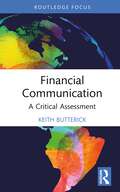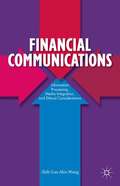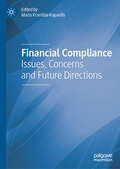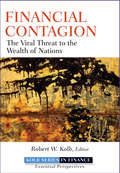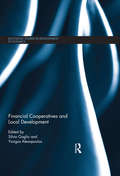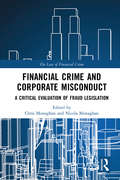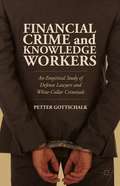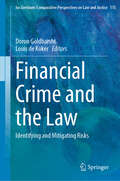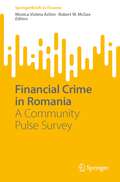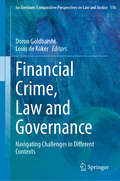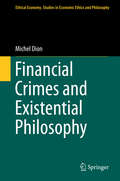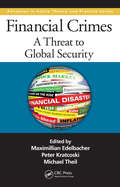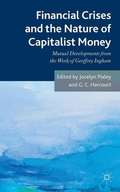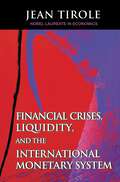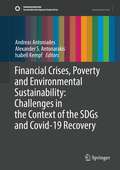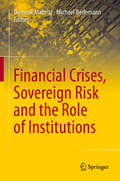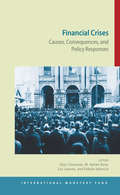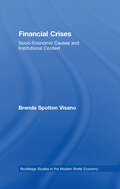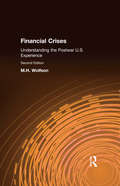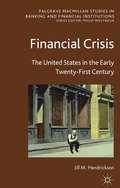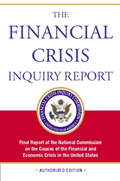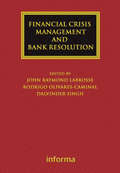- Table View
- List View
Financial Communication: A Critical Assessment (Routledge New Directions in PR & Communication Research)
by Keith ButterickThis essential guide to financial communication provides a concise critical overview of this increasingly important field. It challenges existing assumptions about the role and significance of financial public relations (PR) and investor relations, and the dominant paradigm of shareholder value. This book explores how the dominant paradigm in financial PR is based on the methodologically and historically incorrect assumption of symmetrical communication.Highlighting the importance of financial communications in the corporate hierarchy where it is often a direct function of the Finance Director, this book critically assesses its ideological role in normalising the idea and role of ‘the market’ and promotes the neoliberal view that the sole function of the public company is to increase shareholder value. It opens up new theoretical perspectives by considering retail investor behaviour from the perspective of fandom theory through the behaviour of investors during financial booms, busts and bubbles.This volume will be of interest to researchers in the fields of PR, financial communication, accounting and financial management as well as practitioners working in financial PR and investor relations.
Financial Communications
by Shih-lun Alex WangFinancial Communications showcases why it is crucial for financial institutions to enhance key communication processes, rebuild trust with its customer base, improve relationships, and derive better brand awareness amongst key stakeholders within the industry.
Financial Compliance: Issues, Concerns and Future Directions
by Maria Krambia-KapardisThis book explores the fundamental elements and risks that impact the compliance officer’s work. Following a comprehensive understanding of the role of a compliance officer, by engaging with themes of compliance officers’ liability, expectations, risks and effectiveness, it provides practical answers by leading academics and practitioners in the field. This work also draws on how other areas, such as GDPR, financial regulation and whistleblowing, challenges on compliance officers and provides a way forward to convert these challenges into opportunities. The discussion of compliance challenges and practices in Australia, Europe and the United States provides critical insights into the development of compliance in today’s financial environment. Financial Compliance: Issues, Concerns and Future Directions provides an invaluable working resource for academics, practitioners and a general audience interested in understanding and developing an effective compliance culture.
Financial Conditions and Macroeconomic Performance: Essays in Honor of Hyman P.Minsky
by Steven M. Fazzari Dimitri B. PapadimitriouThis collection of papers on financial instability and its impact on macroeconomic performance honours Hyman P. Minsky and his lifelong work. It is based on a conference at Washington University, St. Louis, in 1990 and includes among the authors Benjamin M. Friedman, Charles P. Kindleberger, Jan Kregel and Steven Fazzari. These papers consider Minsky's definitive analysis that yields such a clear and disturbing sequence of financial events: booms, government intervention to prevent debt contraction and new booms that cause a progressive buildup of new debt, eventually leaving the economy much more fragile financially.
Financial Contagion: The Viral Threat to the Wealth of Nations (Robert W. Kolb Series #604)
by Robert W. Kolb"Financial Contagion: The Viral Threat to the Wealth of Nations covers a lot of territory. It is, of course, terribly important to analyze case histories to discover potential triggers, mechanisms of transmission, and viable ways to contain the damage of financial contagion. The problem is, as these articles amply demonstrate, that there’s always a new virus or a mutation of a former one lurking in some corner of the financial world. We don’t know what it is or where it is. And, even if we had some inkling, there’s almost never enough time to develop a financial flu shot." --SeekingAlpha.com The latest insights on financial contagion and how both nations and investors can effectively deal with it. The domino-style structure in which the financial system exists is a perilous one. Although historically, the financial system has been able to deal with major shocks, the fact remains that our financial system is not as secure as it should be. Recent years have brought about too many examples of contagion and systemic risk. That is why Financial Contagion is such an important read. In it, the serious concerns that revolve around our fragile economic system are investigated, researched, and explained. Throughout the book, Kolb offers valuable insights on this dilemma as he compiles the history of financial contagion, highlights the latest research on systemic failure and interrelated markets, and analyzes the risks and consequences we face moving forward. Examines the importance of careful regulation and what must be done to stabilize the global financial system Includes contributed chapters from both academics and experienced professionals, offering a variety of perspectives and a rich interplay of ideas Details how close we are to witnessing a financial contagion that could devastate the world economy We have been harshly reminded of how fragile our economic ecosystem is. With Financial Contagion, you'll hold a better understanding of what needs to be done to strengthen our system and safeguard our financial future.
Financial Cooperatives and Local Development (Routledge Studies in Development Economics #98)
by Silvio Goglio Yiorgos AlexopoulosThis book examines the opportunities opened up for financial cooperatives by the recent financial crisis, and explores the role of these institutions in promoting and sustaining local development. The global financial crisis has not only shown the limits of the mainstream theory of markets and rational expectations, but has also generated a great deal of disillusionment with the banking system and underlined the importance of a healthy society for the welfare of the individual. Consequently, new and innovative ways of providing finance are needed, especially for strengthening the development of local societies.
Financial Crime and Corporate Misconduct: A Critical Evaluation of Fraud Legislation (The Law of Financial Crime)
by Chris Monaghan and Nicola MonaghanThe Fraud Act 2006 presented a wholesale reform of the pre-existing deception offences under the Theft Act 1968 and Theft Act 1978. This edited collection offers a critical evaluation of fraud legislation and provides a review of the Fraud Act 2006 within the context of measures introduced within the previous decade to combat financial crime, fraud and white-collar offences. The edited collection brings together contributors from a range of unique perspectives including academics, practitioners and a former member of the judiciary. It covers several related themes and provides the reader with a unique and original commentary on how the Fraud Act 2006 has been applied by the courts, the type of prosecutions that have taken place, the effectiveness of the Act, and other legislation which is used to prosecute financial crime and corporate misconduct. It covers procedural and evidential aspects relating to fraud trials, namely consideration of the composition of the tribunal of fact in complex fraud trials, and good character directions in fraud trials. It will be of interest to those teaching and researching in Financial Crime, Corporate Law, Criminal Law, the Law of Evidence, Criminology, Criminal Procedure and Sentencing.
Financial Crime and Knowledge Workers
by Petter GottschalkFinancial Crime and Knowledge Workers examines the role of lawyers in court cases involving white-collar crimes, revealing fresh insights into the relationship between a lawyer's stature and a case's potential verdict.
Financial Crime and the Law: Identifying and Mitigating Risks (Ius Gentium: Comparative Perspectives on Law and Justice #115)
by Doron Goldbarsht Louis De KokerDive into the intricate realm of modern financial crime combating with this latest collection. Edited by global experts and featuring contributions from leading international scholars, the collection spans a spectrum of financial crimes, including crypto crime, terrorist financing, illegal logging, and money laundering. The collection provides focused insights into institutional risk-based compliance, offering perspectives on practices employed by banks and challenges faced in implementing risk-based measures to combat the financing of weapons of mass destruction. Additionally, it explores the interplay between cannabis regulation and money laundering. The collection raises thought-provoking questions about the effectiveness and efficiency of the risk-based approach to financial crime. It explores the evidence supporting its implementation and whether it has proven to be the best alternative. Specific concerns regarding bias and discrimination, especially in relation to mutual evaluations conducted by the Financial Action Task Force, are addressed. In light of these concerns and current evidence, the collection provides constructive proposals and enhances the understanding of the challenges that need to be navigated in the ongoing fight against financial crime. This book a product of the Financial Integrity Hub (FIH), is essential reading for professionals, scholars, and anyone interested in staying ahead in the ever-evolving landscape of financial crime risk management. Chapters "The Crime-Crypto Nexus: Nuancing Risk across Crypto-Crime Transactions" and "The FATF’s Combating of Financing of Proliferation Standards: Private Sector Implementation Challenges" are available open access under a Creative Commons Attribution 4.0 International License> via link.springer.com.
Financial Crime in Romania: A Community Pulse Survey (SpringerBriefs in Finance)
by Monica Violeta Achim Robert W. McGeeThis book explores financial crime and corruption in Romanian society based on a community pulse study. It examines the main behavioral patterns of Romanian society in relation to financial crime variables such as tax compliance, tax morale, corruption in public institutions, and money laundering. The authors also investigate how various demographic aspects (e.g., age, gender, region, professional status, education, etc.) are associated with financial crime. The results of the enclosed survey help policy makers consider best practices in financial governance to reduce the level of financial crime in the region.
Financial Crime, Law and Governance: Navigating Challenges in Different Contexts (Ius Gentium: Comparative Perspectives on Law and Justice #116)
by Doron Goldbarsht Louis De KokerEmbark on a journey through the dynamic landscape of global financial crime combating with our latest collection, meticulously curated by leading researchers. At the intersection of finance, technology, law, governance, and international cooperation, this multidisciplinary exploration offers profound insights into the nuanced world of financial crime across diverse jurisdictions, including Australia, Germany, New Zealand, Nigeria and the United Kingdom. Discover a wealth of knowledge as contributors investigate facets such as asset forfeiture, non-conviction-based asset recovery, money laundering in the real estate sector, and the challenges and opportunities posed by new technologies and fintechs. Unravel the crypto crime and terror nexus and explore the necessity of public–private collaboration to combat the abuse of Non-Fungible Tokens. Dive into policy approaches, including the WireCard scandal, and understand how good governance, both public and corporate, remains paramount in the fight against financial crime. As we navigate an age of intergovernmental rulemaking, the collection emphasizes the crucial role of robust governance frameworks and examines the impact of permissive regulation on practices in the City of London. Delve into discussions on crime risk, risk management, de-risking, and the potential consequences of overcompliance and conservative risk approaches on financial exclusion levels. While global standards on financial crime have solidified over the past three decades, the future direction of standard-setting and compliance enforcement remains uncertain in our complex global political landscape. The collection concludes by pondering these current challenges, offering a thought-provoking exploration of what lies ahead. This collection a product of the Financial Integrity Hub (FIH), serves as a valuable resource for financial regulators, compliance officers, and scholars, offering profound insights and perspectives to navigate the dynamic landscape of financial crime combatting. Chapters "Non-Conviction-Based Asset Recovery in Nigeria – An Additional Tool for Law Enforcement Agencies?", "'De-risking’ Denials of Bank Services: An Over-Compliance Dilemma?" and "Terror on the Blockchain: The Emergent Crypto-Crime-Terror Nexus" are available open access under a Creative Commons Attribution 4.0 International License via link.springer.com.
Financial Crimes and Existential Philosophy
by Michel DionThe aim of this book is to deepen our understanding of financial crimes as phenomena. It uses concepts of existential philosophies that are relevant to dissecting the phenomenon of financial crimes. With the help of these concepts, the book makes clear what the impact of financial crimes is on the way a human being defines himself or the way he focuses on a given notion of humankind. The book unveils how the growth of financial crimes has contributed to the increase of the anthropological gap, and how the phenomenon of financial crimes now distorts the way we understand humankind. Using the existential philosophies of Kierkegaard, Nietzsche, Jaspers, Buber, Heidegger, and Marcel, the book sheds light on how these philosophies can help to better perceive and describe financial crimes. Next it looks at prevention strategies from an organizational perspective, using concepts of Sartre, Gadamer and Tillich. The book provides readers with existential principles that will help them be more efficient when they have to design and implement prevention strategies against corporate crime.
Financial Crimes: A Threat to Global Security
by Maximillian Edelbacher, Peter Kratcoski and Michael TheilFinancial market reform has focused chiefly on the threats to stability arising from the risky, uncontrolled activity of the leaders of financial institutions. Nevertheless, organized crime, white-collar crime, and corruption have a huge impact on financial systems worldwide and must also be confronted if true reform is to be achieved. A collection
Financial Crimes: A Threat to Global Security (Advances in Police Theory and Practice)
by Peter Kratcoski Michael Theil Maximillian EdelbacherFinancial market reform has focused chiefly on the threats to stability arising from the risky, uncontrolled activity of the leaders of financial institutions. Nevertheless, organized crime, white-collar crime, and corruption have a huge impact on financial systems worldwide and must also be confronted if true reform is to be achieved. A collection
Financial Crises and the Nature of Capitalist Money: Mutual Developments from the Work of Geoffrey Ingham
by Jocelyn Pixley G. C. HarcourtThis volume is a debate about a sociology and economics of money: a form of positive trespassing. It is unique in being written by scholars of both disciplines committed to this mutual venture and in starting from the original groundwork laid by Geoffrey Ingham. The contributors look critically at money's institutions and the meanings and history of money-creation and show the cross cutting purposes or incommensurable sides of money and its crises. These arise from severe tensions and social conflicts about the production of money and its many purposes. We demonstrate the centrality of money to capitalism and consider social disorders since the 2007 crisis, which marks the timeliness and need for dialogue. Both disciplines have far too much to offer to remain in the former, damaging standoff. While we are thankful to see a possible diminution of this split, remnants are maintained by mainstream economic and sociological theorists who, after all the crises of the past 30 years, and many before, still hold to an argument that money really does not 'matter'. We suggest, to many different and interested audiences, that since money is a promise, understanding this social relation must be a joint though plural task between economics and sociology at the very least.
Financial Crises and the Politics of Macroeconomic Adjustments
by Stefanie WalterWhen are policy makers willing to make costly adjustments to their macroeconomic policies to mitigate balance-of-payments problems? Which types of adjustment strategies do they choose? Under what circumstances do they delay reform, and when are such delays likely to result in financial crises? To answer these questions, this book examines how macroeconomic policy adjustments affect individual voters in financially open economies and argues that the anticipation of these distributional effects influences policy makers' decisions about the timing and the type of reform. Empirically, the book combines analyses of cross-national survey data of voters' and firms' policy evaluations with comparative case studies of national policy responses to the Asian Financial Crisis of 1997/8 and the recent Global Financial Crisis in Eastern Europe. The book shows that variation in policy makers' willingness to implement reform can be traced back to differences in the vulnerability profiles of their countries' electorates.
Financial Crises, Liquidity, and the International Monetary System
by Jean TiroleOnce upon a time, economists saw capital account liberalization--the free and unrestricted flow of capital in and out of countries--as unambiguously good. Good for debtor states, good for the world economy. No longer. Spectacular banking and currency crises in recent decades have shattered the consensus. In this remarkably clear and pithy volume, one of Europe's leading economists examines these crises, the reforms being undertaken to prevent them, and how global financial institutions might be restructured to this end. Jean Tirole first analyzes the current views on the crises and on the reform of the international financial architecture. Reform proposals often treat the symptoms rather than the fundamentals, he argues, and sometimes fail to reconcile the objectives of setting effective financing conditions while ensuring that a country "owns" its reform program. A proper identification of market failures is essential to reformulating the mission of an institution such as the IMF, he emphasizes. Next he adapts the basic principles of corporate governance, liquidity provision, and risk management of corporations to the particulars of country borrowing. Building on a "dual- and common-agency perspective," he revisits commonly advocated policies and considers how multilateral organizations can help debtor countries reap enhanced benefits while liberalizing their capital accounts. Based on the Paolo Baffi Lecture the author delivered at the Bank of Italy, this refreshingly accessible book is teeming with rich insights that researchers, policymakers, and students at all levels will find indispensable.
Financial Crises, Poverty and Environmental Sustainability: Challenges in the Context of the SDGs and Covid-19 Recovery (Sustainable Development Goals Series)
by Andreas Antoniades Alexander S. Antonarakis Isabell KempfThis volume advances the state-of-the-art in the study of the interplay among financial crises, poverty dynamics and environmental sustainability. It offers timely and unique contributions to the immediate global challenge of sustainable development. Developing a new evidence-base, the volume offers concrete recommendations for policy action needed in advancing the Sustainable Development Goals (SDGs) in relation to environment and poverty during the current conditions of financial distress. The approach taken is inductive and evidence-driven. Most analysis is based on in-depth case studies that aim to offer a detailed and dynamic picture on how poverty and environmental sustainability interact in specific social contexts and financial crises. In this way the volume aims to generate a wealth of new and concrete evidence that offer a solid foundation to understand the multiple channels through which social and environmental factors interact, and the ways in which this interaction can and should be managed in order to achieve the needed global transition to sustainability. Broader dynamics that are covered and analysed include the historical legacies of structural adjustment and colonialism; the current debt wave experienced in developing countries; the role of inequality; the significant impact that climate change has on livelihoods and on meeting the SDGs; the new challenge presented by the Covid-19 pandemic for the SDGs; the challenge of sustainable funding for SDGs; and the need for a new eco-social contract. Case-studies examined include Cambodia, Ethiopia, India, Indonesia, Zambia, and subregions such as the Caribbean, sub-Saharan Africa and Lower Mekong Countries. The volume is part of a joint initiative by the ‘Sussex Sustainability Research Programme (SSRP)’ of the University of Sussex, the ‘UNDP-UNEP Poverty-Environment Action for Sustainable Development Goals’ and the ‘United Nations Research Institute for Social Development (UNRISD)’. The overall aim is to advance a new research programme and foster a better understanding of the multiple, complex and often opposing ways through which the punctuated economic slowdown of financial crises, poverty dynamics and environmental sustainability interact. It also makes novel recommendations into how poverty reduction and environment can work in synergy rather than being antagonistic, especially during financial distress, leading into recommendations directly geared towards achieving the SDGs and beyond.
Financial Crises, Sovereign Risk and the Role of Institutions
by Dominik Maltritz Michael BerlemannThe recent world economic crisis showed very clearly that financial crises and sovereign defaults are severe threats to economic and social prosperity. In addition, it became apparent that currency crises and banking crises often occur together and are closely related to sovereign debt crises and defaults. The present book contains new research on various important issues related to financial crises and sovereign default risk by leading experts in the field. The book discusses new modelling approaches to financial crises, defaults and their interdependencies. It also sheds light on the consequences of different sorts of crises for the trust in the institutions which are concerned with managing them. Moreover, it provides discussions of several institutional features of the EMU and the world financial system and in particular the risks inherent in these institutions. The book also includes interesting suggestions for solving crises and improving financial stability.
Financial Crises: Causes, Consequences, and Policy Responses
by M. Ayhan Kose Stijn Claessens Luc Laeven Fabián ValenciaA report from the International Monetary Fund.
Financial Crises: Socio-Economic Causes and Institutional Context (Routledge Studies in the Modern World Economy)
by Brenda Spotton VisanoThis study explores the major patterns of change in the evolution of financial crises as enduring phenomena and analyzes the paradoxical position that crises are at once similar to and different from each other. Brenda Spotton-Visano examines economic, psychological and social elements intrinsic to the process of capitalist accumulation and innovation to explain the enduring similarities of crises across historical episodes. She also assesses the impact that changing financial and economic structures have on determining the specific nature of crises and the differential effect these have in focal point, manner and extent of transmission to other, otherwise unrelated, parts of the economy. Financial Crises offers a consistent method for interpreting variations in financial crises through time and allows for a better overall appreciation for both the transitory fragility and enduring flexibility of financial capitalism and the potential vulnerability created by on-going financial development. Topical and informative, this key book is of keen interest to all those studying and researching international economics and political economy.
Financial Crises: Understanding the Postwar U.S. Experience
by M.H. WolfsonThis book is a survey and critique of the major theories of financial crises. The first edition built a model of crisis from an analysis of postwar financial crises in the US through the mid-1980s. The second edition continues the story from 1985 and covers the stock market crash of 1987, the collapse of the Savings and Loan industry, the severe problems of US commercial banks, and the increasing risks posed by junk bonds. A new chapter analyses the causes of increasing financial instability in the 1980s. The book's extensive charts and tables are fully revised and updated to present the latest evidence. The first edition has gained wide interest as a supplemental text.
Financial Crisis
by Jill M. HendricksonThe 2007-2009 financial crisis caught many by surprise. When the dust began to settle, people began looking around and asking how this could have happened and why we did not see it coming. Criticism fell heavily on the economics profession because there was a feeling that the models and theories of economics had failed to properly warn and prepare us for a significant crisis. This book carefully analyses existing theories of financial crisis to determine if they are still appropriate for understanding modern financial crises. This is an important endeavour because financial crisis theory has largely been ignored for many years. Indeed, it has been almost twenty years since economists have seriously reconsidered financial crisis theory. This book fills that gap and offers insight into the current debate regarding the efficacy of economic models and theories relevant to understanding financial distress.
Financial Crisis Inquiry Report: Final Report of the National Commission on the Causes of the Financial and Economic Crisis in the Un
by Financial Crisis Inquiry CommissionOfficial Government Edition The definitive report on what caused America's economic meltdownOCo and who was responsibleThe financial and economic crisis has touched the lives of millions of Americans who have lost their jobs and their homes, but many have little understanding of how it happened. Now, in this very accessible report, readers can get the facts. Formed in May 2009, the Financial Crisis Inquiry Commission (FCIC) is a panel of 10 commissioners with experience in business, regulations, economics, and housing, chosen by Congress to explain what happened and why it happened. This panel has had subpoena power that enabled them to interview people and examine documents that no reporter had access to. The FCIC has reviewed millions of pages of documents, and interviewed more than 600 leaders, experts, and participants in the financial markets and government regulatory agencies, as well as individuals and businesses affected by the crisis. In the tradition of The 9/11 Commission Report, "The Financial Crisis Inquiry Report" will be a comprehensive book for the lay reader, complete with a glossary, charts, and easy-to-read diagrams, and a timeline that includes important events. It will be read by policy makers, corporate executives, regulators, government agencies, and the American people.
Financial Crisis Management and Bank Resolution
by Dalvinder Singh John Raymond LaBrosse Rodrigo Olivares-CaminalFinancial Crisis Management and Bank Resolution provides an analysis of the responses to the recent crisis that has beset the international financial markets taking a top down approach looking at the mechanisms to manage a financial crisis, to the practicalities of dealing with the resolution of a bank experiencing distress. This work is an interdisciplinary analysis of the law and policy surrounding crisis management and bank resolution. It comprises contributions from a team of leading experts in the field that have been carefully selected from across the globe. These experts are drawn from the law, central banks, government, financial services and academia. This edited collection will provide a new and important contribution to the subject at a crucial time in the debate around banking resolution and crisis management regimes, and help to plug the gap in our knowledge and understanding of the law of bank resolution and restructuring.
